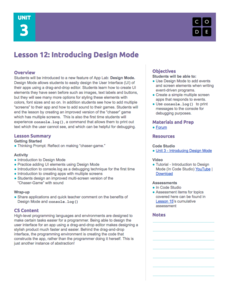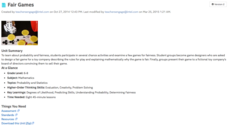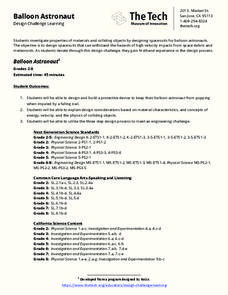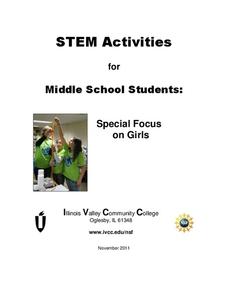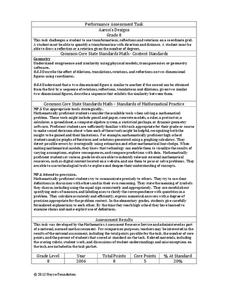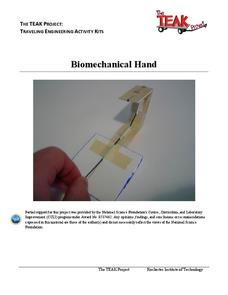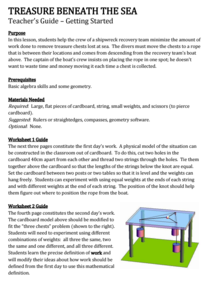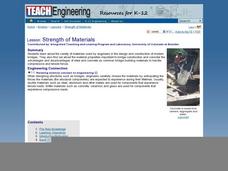Maker Media
Makerspace Playbook
Make the most of project-based learning with Makerspace. A playbook shows instructors and other interested parties how to set up a Makerspace and Maker community to foster STEM projects. It gives ideas for startup activities and for...
Big Learning
The Antarctica Project: A Middle School Mathematics Unit
Antarctica is a big place, large enough to provide ample opportunities to learn about math. A two-week unit teaches middle school mathematics concepts using project-based learning. The resource covers functions, geometry (area,...
Scholastic
STEM Challenges and Activity Sheets for Grades 6–8
From 3-D cities to building bridges, young engineers engage in innovative STEM challenges that promote brainstorming and collaboration. Learners take on the roles of different types of engineers as well as become familiar...
Teach Engineering
Chair Design
Can you design the perfect chair? Scholars apply the engineering design process to design and build a prototype of a new type of chair from wires. They test their designs with a wooden artist model or stuffed animal.
Code.org
Introducing Design Mode
Move beyond buttons when designing user interfaces. In the fourth installment of a 21-part unit, young computer scientists learn to apply design mode, which gives users options for colors, fonts, etc. They learn to incorporate these...
Intel
Fair Games
Who said things were fair? The unit introduces probability and its connection to fairness. The class interacts with activities of chance and plays games to relate them to fairness. Groups design a fair game and develop a presentation....
Tech Museum of Innovation
Balloon Astronaut
Design protection from high-speed particles. The STEM lesson plan highlights why astronauts need protection from space debris. Pupils use the design process to design, build, and test a spacesuit that will protect a balloon from a...
Illinois Valley Community College
STEM Activities for Middle School Students
Use STEM activities within the class to provide connections to concepts. The resource includes activities that range from working with buoyancy to building rockets and launching them. Other activities involve the engineering design...
Rochester Institue of Technology
Ergonomic Design
To an engineer, the glass is never half full; it's just double the necessary size. The fifth installment of a nine-part technology and engineering series teaches pupils about the idea of ergonomic design. Measurements of popliteal height...
Bowland
Design the Mascot
Explore how resizing an object affects its area. The set of lessons challenges young mathematicians to design a mascot for electronic devices. These designs undergo resizing to determine how scale factors of dilation affect area.
Inside Mathematics
Aaron's Designs
Working with transformations allows the class to take a turn for the better. The short assessment has class members perform transformations on the coordinate plane. The translations, reflections, and rotations create pattern designs on...
Teach Engineering
Concentrating on the Sun with PVs
Concentrate to determine the best reflector design. Pairs use the engineering design process to build a reflector to increase the current output of a photovotaic panel. Teams arrive at a final design and present it to the class along...
Teach Engineering
Where Are the Plastics Near Me? (Mapping the Data)
The last activity in a nine-part series has teams create a Google Earth map using the data they collected during a field trip. Using the map, groups analyze the results and make adjustments to the map to reflect their analysis. A short...
Rochester Institute of Technology
Biomechanical Hand
In 1993, five biomedical engineers in Edinburgh, Scotland, created the first functional bionic arm. In the activity, learners explore the world of bioengineering through discussion and hands-on exploration. In groups, participants...
Rochester Institue of Technology
Meal Picking
Scholars explore systems design and its relation to meal picking by using computer simulations to test systems designs. They learn about the Pick-to-Light System and calculate average picking times.
Balanced Assessment
Fermi Number
A fermi number is a rough estimate of a quantity that is difficult or impossible to measure. Individuals design a process for making an estimation of a given scenario. For example, they determine a plan for estimating the number of...
Teach Engineering
Cost Comparisons
Our final proposal for the cost of the bridge requested is ... In the last segment in a series of 10, pairs work together to develop a proposal for a city bridge design. The class completes a cost comparison between concrete and steel to...
Teach Engineering
Incoming Asteroid! What's the Problem?
Oh, no! An asteroid is on a collision course with Earth!. Class members must rise to the challenge of designing a shelter that will protect people from the impact and permit them to live in this shelter for one year. In this first lesson...
Teach Engineering
Off-Road Wheelchair Challenge
Challenge your class to use their understanding of the engineering design process to design and build a small-scale, off-road prototype for an assistive technology device. Teams select materials to build their scale models, and, using...
California Mathematics Project
Treasure Beneath the Sea
Explore the geometry of treasure hunting! Learners use geometry to design a treasure recovery strategy. The objective is to create a design that minimizes the amount of work required. Budding mathematicians use properties of triangles as...
Teach Engineering
Strength of Materials
Pupils examine a stress-strain diagram that compares the advantages and disadvantages of the two common bridge building materials, concrete and steel. The also consider the factors that influence the materials builders choose for their...
Teach Engineering
Load It Up!
See how a marshmallow can hold up a bridge load. Teams take a closer look at the design of bridge piers. They determine the types of loads that might affect a bridge, and, using that information, they calculate the needed cross-sectional...
Teach Engineering
Designing Bridges
Introduces your class to the types of loads experienced by a bridge. Groups calculate the ultimate load combinations to determine the maximum load requirement. Using this information, builders then determine the amount of material they...
Teach Engineering
Straw Bridges
Pairs work as engineering teams to design and build model bridges from drinking straws and tape. In this third segment in a series of 10, teams compete in an attempt to build the strongest bridge. To help with the design, the groups...






